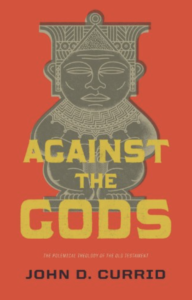My Endorsement:
The Old Testament addressed an ancient context that was filled with perspectives, powers, and practices sometimes like but often unlike those of our western world. A rising influential voice, even within evangelical circles, is asserting that the biblical worldview, while monotheistic, often parallels and at times pirates with minimal discrimination the pre-enlightened religious ideas and rituals of ancient Israel’s neighbors. In contrast, by affirming the Old Testament’s historical reliability and by showing the need to assess not only similarities but also differences with comparative ancient accounts, John Currid persuasively demonstrates in Against the Gods that the Bible’s tendency is not to appropriate but to dispute and repudiate pagan myths, ideas, identities, and customs by establishing the authentic, original historical event that had been vulgarized and distorted through polytheism, magic, violence, and paganism or by showing that what was myth in the ancient world had become real and factual in Israel’s time and history. Loaded with examples and clearly written commentary that respects the nature of God’s Word, this important introduction to Old Testament polemical theology provides a balanced corrective to many current comparative studies.
Publisher’s Description:
Table of Contents:
Prologue
- A Brief History of Ancient Near Eastern Studies
- The Nature of Polemical Thought and Writing
- Genesis 1 and Other Ancient Near Eastern Creation Accounts
- Ancient Near Eastern Flood Accounts and the Noahic Deluge of Genesis 6–9
- Joseph, the Tale of the Two Brothers, and the Spurned Seductress Motiff
- The Birth of the Deliverer
- The Flights of Sinuhe and Moses
- Who Is “I am that I am”? Exodus 3 and the Egyptian Book of the Heavenly Cow
- The Rod of Moses
- The Parting Waters of the Red Sea
- Canaanite Motifs
General Index
Scripture Index
*****
For a similar helpful volume that identifies close connections between the ancient world and Scripture, see Jeffrey J. Niehaus, Ancient Near Eastern Themes in Biblical Theology (Grand Rapids: Kregel, 2008).






